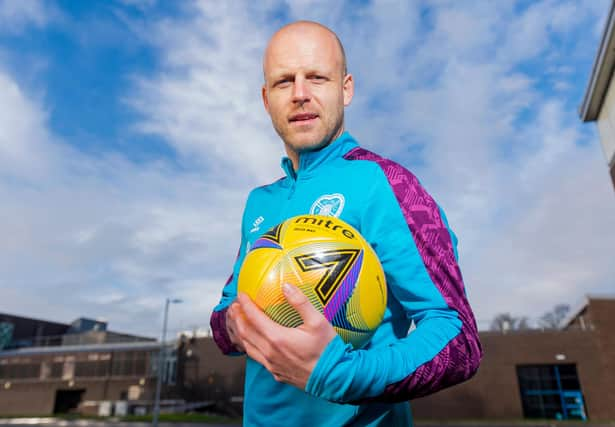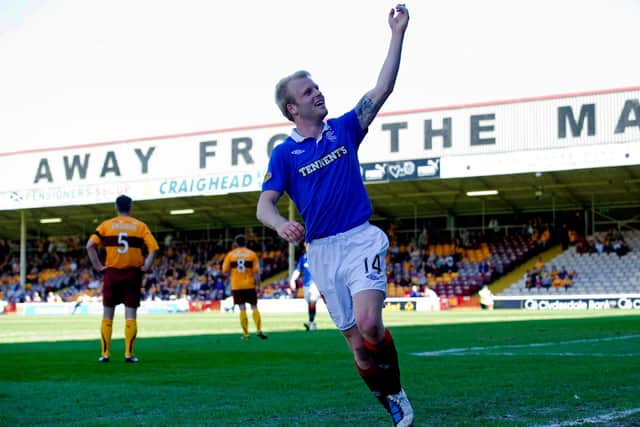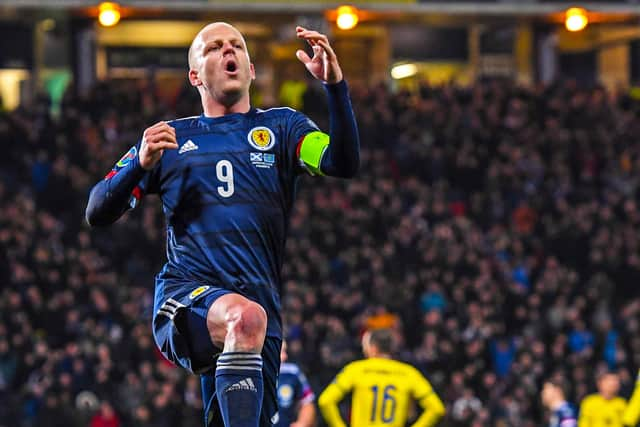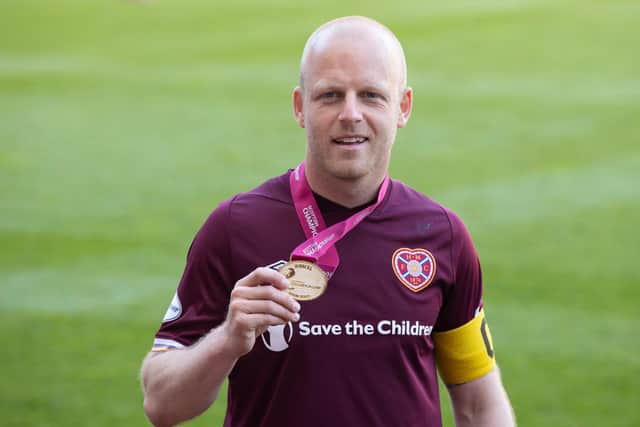Hearts coach Steven Naismith on vanquishing Hibs, battles with Broony, managerial ambitions, battered by Rangers fans and being big-hearted footballer


Covid curbed fright-night guising – and it caused the national stadium to be empty for the all-Edinburgh Scottish Cup semi-final – but Naismith made a bogeyman’s entrance ten minutes into the second half which spooked Hibernian and in two rapid returns to Mount Florida they couldn’t lose the fear.
A few hours after Ross’ departure from Leith I’m on the other side of the capital at Hearts’ training base at Oriam, where Naismith has given up a long and fruitful playing career – and those scary confrontations with the likes of Scott Brown and Jonny Hayes – to become a coach. The gaze can narrow when the subject of his – euphemism alert – competitiveness comes up, but he is far from intimidating today. Instead, entertaining, thoughtful and, on the subject of that semi, insightful.
Advertisement
Hide AdAdvertisement
Hide AdNaismith, 35, won his first Edinburgh derby and his last, with a couple more victories in between. He enjoyed the fixture, would have enjoyed it more if both clubs had been performing well at the same moment, so I’m wondering what he reckons to the Hibee mentality for big games, always a popular topic for the nation’s weekend psychologists.


“That day we saw Hibs as a decent football team with good players – and they still have them – but it was all on their terms,” he says. “Similarly this season I saw them beat Ross County, they played well, but it was all on their terms. If they’re allowed, they’ll turn in nice performances where they dictate the tempo, play their passes, drop teams in deep and dominate possession. To beat them you have to disrupt that and as a sub in the semi I knew I had to get on, get in about them in the middle of the park and make an impact.
“I was going to have half an hour at most as I was coming back from injury but because there was extra-time I had to play double that. Watching the first 45 we didn’t play well. We were nervous and couldn’t get out of our own half. Myself and Peter Haring came on together and I knew what had to happen: ‘Get me on the ball here.’ With Hibs playing their nice football, we needed to be more expansive. The first three balls I took on the half-turn, played them forward on the angle and got them scrambling.”
That’s twice in a matter of seconds Naisy has called Hibs nice, which is probably another euphemism. So, having seen Ross break his hoodoo for calendar-ringed matches and steer Hibs to a final only to lose his job a couple of weeks later, what’s his ambition on the touchlines? Surely it’s not to enter that most hazardous of professions and become a manager?
“Aye it is,” chirrups this proud son of Ayrshire. “Right from the start as a player I was intrigued by it. At my first club Kilmarnock under Jim Jefferies and Billy Brown I was always jotting down stuff.” What, actually in a wee swotty notebook? “Yes, I’m old-school: paper, pen, diary.” So were the venerable twosome impressed? “I think they thought I was a wee squirt who asked too many questions!


“Then at Rangers, not long having gone there, we were losing at half-time up at Inverness and Walter Smith hooked me. I was like: ‘Ohmigod, how bad was I?’ Later Walter explained it: ‘You weren’t having a poor game, son, but I had to change something. This is Rangers and we always need to win.’ I made a note of that as well, and the same when Walter told me how at Everton he let Olivier Dacourt go back to France for treatment for an injury. He could have insisted the player stayed at the club but probably knew Olivier would keep saying ‘Not ready yet, gaffer’ and this could go on for eight weeks. He was told he could have two weeks in France and Walter got him back in four. That told me: not all players are the same, you have to treat them all differently.” And Naismith is certainly different, a footballer who was quietly displaying a passionate social conscience long before the justly-celebrated Marcus Rashford appeared on the scene.
Over the years and the seasons – Everton himself and Norwich City, 52 caps for Scotland, a last hurrah at Hearts, charging around, snaffling goals, biting ankles and looking like he never wanted it to end – he got to fill a lot of notebooks. He delved into them in the summer while pondering the switch to coaching – his title at Tynecastle is football development manager – and it was a phonecall from the great Govan oracle himself which helped him make up his mind, although it also told our man that you can never be too thorough.
“A mutual friend who knows Fergie [Sir Alex Ferguson] mentioned to him how much I’d enjoyed his documentary [Never Give in]. The night Man U won the Champions League in Barcelona – you know I couldn’t sleep after it I was so excited and had to plead with my parents to let me stay off school the next day. So, there I was in my garden and suddenly we were chatting away about management for a full hour, Fergie telling me how tough it would be and how it would take over my life. My father dines out on Sir Alex stories – how as a boy he’d be playing football in the street with his pals hoping Fergie would happen by, boot the ball back to them or even join in their game. Fergie liked that story, asked me where Dad lived. Now I could tell you, yesterday, today and tomorrow, that it was Simshill but, bumbling away, my mind went blank. Fergie said: ‘Son, you should know where your father grew up and always remember it.’”
Advertisement
Hide AdAdvertisement
Hide AdThat’s not the first time Naisy has fielded a “surreal” call from a Scottish knight of the realm. In an interview while at Rangers he revealed he was dyslexic. Then Ibrox chairman David Murray read it and told Sean Connery. The movie icon left a voice message which Naismith thought was a wind-up and he’d play what he assumed was a spot-on impersonation to amused team-mates, until Connery called again. “We had a good chat. I mean, out of this world but fascinating. Then he said his friend Jackie wanted to speak to me – this was Jackie Stewart.”


From there Naismith became an ambassador for Dyslexia Scotland, telling young folk how he achieved despite learning difficulties and how they can, too. “A girl at the last talk I gave, at a school in Ayr, didn’t need my help. She got up and spoke about her dyslexia at assembly and smashed it – brilliant. Me, I was always uncomfortable in English if I had to read in class. These talks, though I love doing them, still make me nervous. Being good at football earned me a lot of credit with teachers and the other kids.”
That’s only part of Naismith’s story of helping others. He’s supported homeless charities, sent free tickets for games to Job Centres, backed a scheme to help ex-servicemen find work on Civvy Street and paid for hundreds of Christmas lunches, with the latest jingle ‘n’ mingle sessions starting in Glasgow and Liverpool soon.
So where does the social conscience come from? “There wasn’t a great revelation. I think it’s my parents and where I’m from. When I moved to England I kept on my house in Stewarton because I always knew I’d be going back there. It’s got a good community spirit. My mates now were my mates at school. Retiring from football was tough until I realised: ‘Great, I can go back to playing five-a-sides with the boys on Monday nights again.’” Now he and his dentist wife Moya and their two daughters live in a house he’s designed after watching endless home shows on TV. “I’m still just Naisy from Stewarton,” he adds.
He thanks his parents, David and Rosie, for instilling good values in him. “They worked hard for my two sisters and me. Dad was a social worker and Mum worked in a supermarket so they were never flush with money but I always got a new football shirt for every holiday. Sometimes I think they gave us too much.
“I learned good morals from them. Dad was no angel when he was younger but when the family came along he went to uni, got a degree and worked at a residential school for disadvantaged kids for 36 years, right the way up to management. He was also my boys’ club coach at Stewarton Annick from eight to 13 so would like me to say that he taught me all I know. He was hardest on me, being his son, but I didn’t mind that and reckon it did me good.
“Mum and Dad showed me right from wrong. I think I had a good understanding of that from a young age. Stuff that might seem trivial such as someone in the playground not being treated fairly, then I’d speak up. The things I did as a player, helping folk who’ve been priced out of football get to games, weren’t massive but hopefully they raised awareness. If I’d had the life of young footballers now, being taken away from my home town and put in a flat with other footballers, with all that time and money on my hands, then possibly just stopping to think about life outside that bubble wouldn’t have occurred to me. But being with pals going to college or learning a trade kept my feet on the ground.”
Maybe, I suggest, if he becomes a manager and a prominent one he could change the culture. “Nice idea, but there are a lot of agendas in football.” Without wishing to sound like Matt Hancock, the disgraced former Health Secretary, does he think more footballers should give something back? “Well, being a player is a privileged position. In your prime everyone wants to be your mate. You can use that to your own advantage so you might say: use it to the advantage of those less fortunate. But helping others shouldn’t be forced and token gestures are no good. The player must want to do it, and be prepared to see it through.
Advertisement
Hide AdAdvertisement
Hide Ad“Getting the chance to become a footballer I know I was dead lucky. But life is unfair and I know that too.” So is he political? “Not really. What’s happening just now, though [the Christmas party scandal engulfing Boris Johnson’s government], angers me. I think we’re all being taken for a ride.
"When I’m at the lunches it’s not about me, although I get a lot just from hearing these folks’ stories. And I come away thinking: ‘I’ve done something right today.’”
As a player Naismith did most things right. The titles and cups won at Ibrox confirm that. “I enjoyed the pressure and thrived on the intensity, even if I was being battered by the Rangers fans.” The fact his caps conferred on him by no less than six managers tells you that. He was picked most by Gordon Strachan. “We had a good squad at that time but probably not everyone was as invested in the national team as they could have been.” He can see the commitment and passion now for, having won the last of his appearances under Steve Clarke, and signed off with a goal against Kazakhstan, Naisy has since joined the coaching team. Next year it’s the World Cup and, playoffs permitting, what an experience that would be for the manager aspirant.
We finish where we started, with that Hibs-Hearts semi when Naismith grabbed the tie by the scruff of the neck, the Hibees unable to respond. “Something I noticed when I returned to Scotland: it seems harder to come back when a team fall behind. The game here is hectic, basketball-like, with not loads of control, while in England the comparison would be with chess. ‘We’ve made this move, what are you going to do?’ In Scotland there often isn’t a clear plan for how to respond. It’ll be more about getting in the opposition’s faces in the hope they’ll make a mistake.”
Mind you, Naismith could have counted freckles and nostril hairs the way he played out his career with the Jambos. The confrontational style of the player rival fans love to hate wasn’t his way before – what changed? “What can I say? I was up for the fight but I had to be. Earlier on I relied on experienced team-mates to do that but by the time I got to Hearts I was that experienced team-mate so it was down to me.”
Tackles fly, eyes bulge, the veins in the neck throb – but afterwards the aggro is forgotten and Naismith will cheerily bump into Jonny Hayes on the training course for coaching badges. “Football’s amazing for that. One minute I’m battling with Alex Neil when he’s playing for Hamilton; the next he’s my manager at Norwich.” And Broony, what of those bar-room brawls in Hearts-Celtic clashes? “We’re very similar characters and would both do anything to win. There was that match when I left a bit of him and then he caught me on the throat. We both know the game: you’re trying to get the other guy to lose concentration for a second, or to rile him to such an extent he does something mad. But at the end you wouldn’t have seen me and Broony walking off without shaking hands. He’s a mate. We hung about with Scotland together and we’ll meet up for a game of golf.” So he’ll be sending his old foe a Christmas card then? “Eh … nah! But I’m going to miss those battles. I haven’t done yet – eventually, though, it’s going to hit me.”
A message from the Editor:
Get a year of unlimited access to all of The Scotsman's sport coverage without the need for a full subscription. Expert analysis of the biggest games, exclusive interviews, live blogs, transfer news and 70 per cent fewer ads on Scotsman.com - all for less than £1 a week. Subscribe to us today
Comments
Want to join the conversation? Please or to comment on this article.